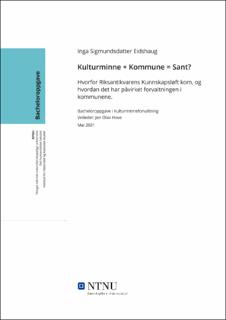Kulturminne + kommune = sant?
Bachelor thesis
Permanent lenke
https://hdl.handle.net/11250/2775774Utgivelsesdato
2021Metadata
Vis full innførselSamlinger
Sammendrag
Bacheloroppgaven «Kulturminne + kommune = sant?» er en oppgave som undersøker hvorfor Riksantikvarens Kunnskapsløft for kulturminneforvaltningen kom, og hvordan prosjektet har påvirket forvaltningen i kommunene, da særlig med hovedfokus på digitalisering og hvordan kommunene har opplevd prosjektet. Oppgaven er delt inn i 2 hoveddeler (del 2 og 3) og hver del har sin egen metode. Oppgavens del 2 går inn på hvorfor Kunnskapsløftet kom, og undersøker dette gjennom å gå gjennom stortingsmeldinger som legger ut om temaet; Altså en litterær undersøkelse. Oppgavens del 3 undersøker hvordan Kunnskapsløftet har påvirket kommunene, og gjør dette ved at det ble foretatt intervju av tre kommuner: kvalitative intervju. Kommunene som blir intervjuet er: Trondheim, Røros og Namsos.Oppgaven legger fram grunnlaget for Kunnskapsløftets behov for å nå Regjeringens mål i Kulturminnepolitikken, samt hvordan kommunene har opplevd Kunnskapsløftet. For at regjeringen skulle nå målet var det nødvendig med en kompetanseheving i kommunene. I tillegg så opplevde de kommunene som fikk midler til å utarbeide en plan, blant annet en økt forståelse for kommunens historie og en styrket identitet. The bachelor-thesis “Kulturminne + kommune = sant?” (Cultural heritage + municipality = true?) is a thesis that explores why the Norwegian Directorate for Cultural Heritage (Riksantikvaren) launched the project Knowledge boost for the cultural heritage management, and how the project has impacted the municipalities in Norway. It has a main focus on digitalization and how the municipalities have experienced the project. The thesis has two main parts (part 2 and 3), and each part uses its own method. In part 2 the thesis explores why the Knowledge boost came through investigating reports to the Storting that post about the topic. This is a literary investigation. In part 3, the thesis investigates how the Knowledge boost have impacted the municipalities through interviewing three municipalities: Trondheim, Røros and Namsos. These are qualitative interviews.The thesis embarks om the basis of why the Knowledge boost was needed to meet the governments goals in the cultural heritage politics, and how the municipalities have experienced the Knowledge boost. The Knowledge boost was an important factor for the goal were to be reached, and the municipalities that got their cultural heritage plan funded, experienced among other things that their identity and history was boosted.
